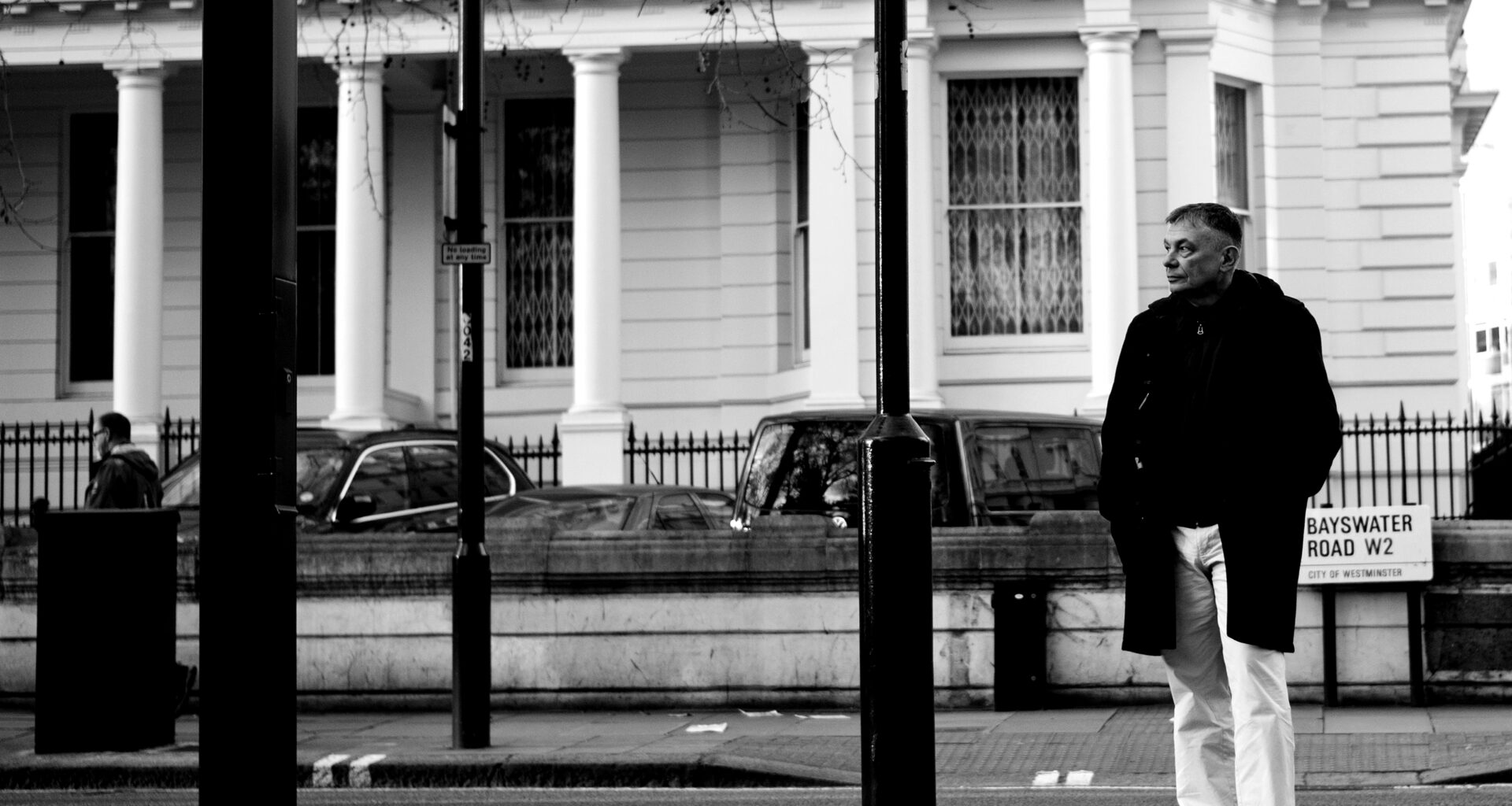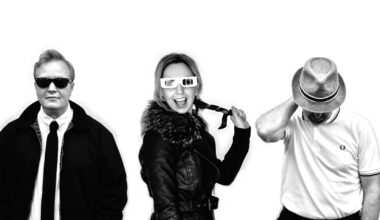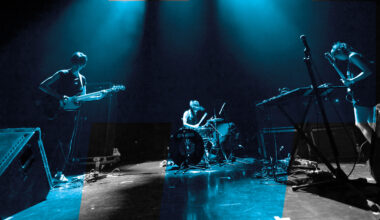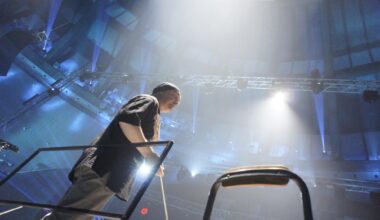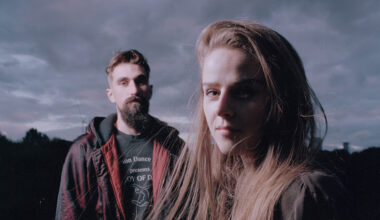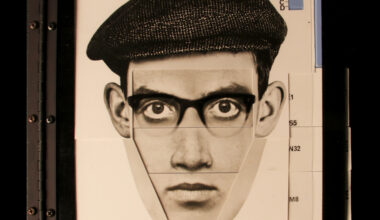On the release of his autobiography, ‘The Sound Of The Machine’, Karl Bartos opens up about working with Ralf and Florian, unpublished demo recordings, and how pioneering technology helped to create Kraftwerk’s extraordinary legacy
For a band so significant, Kraftwerk literature is notably thin on the ground. Such omerta is quite an achievement in the ultra-sharing computer world they so precisely anticipated. Yet previous attempts at biographies have been hobbled by a lack of input, and even legal hostility, from Ralf Hütter and Florian Schneider. The only insider account until now, Wolfgang Flür’s 2000 book, ‘Kraftwerk: I Was A Robot’, famously fell foul of the Kling Klang legal department.
While that memoir was highly entertaining, Wolfgang wasn’t a Kraftwerk songwriter, so his viewpoint was always going to be at a slight remove. All of which is why Karl Bartos’ autobiography, ‘The Sound Of The Machine: My Life In Kraftwerk And Beyond’, finally published in English after its 2017 German edition, has been so keenly anticipated. After all, this is the man who co-wrote every Kraftwerk track from ‘The Man-Machine’ to ‘Electric Café’.
A citizen of Hamburg for many years now, Karl tackles my first and obvious question genially. What took you so long?
“I was late, I know,” he says apologetically. “It took me a long time to get it done. It’s really heavy and time-consuming. It was like mining ground. Everywhere it was dangerous. My ex-partner” – he means Ralf, of course – “claimed to have a lot of humour, but it’s nothing to laugh about now.”
So why write it at all?
“For a long time, there was only one Kraftwerk narrative,” he says. “I think it’s time to open up a second perspective. After all, three composers and one poet were involved in our music, not one ex-member of the classic line-up and some engineers. I wanted to look at everything again, analyse it and draw the right conclusions. The fairy tale told over and over about our music, our time together and the different roles was in dire need of an addition or two from me. One person, even if he was able to buy the brand name, didn’t create the musical work alone.”
Since his departure from the band in 1990, around the time of ‘The Mix’, Karl has had plenty of opportunities to reflect on his tenure.
“You know, I left Kraftwerk 30 years ago, and since then I’ve given many interviews,” he says. “And there were always Kraftwerk questions, but I tried to stick to the music and not the turmoil. I had the feeling that if I was to make my point, I would have to know exactly what I was talking about. So I have gone through an analysis of it. I needed to put down all the facts and everything I could remember about the old music.”
In this particular endeavour, he was helped by a stash which will have Kraftwerk obsessives in a whirl.
“I still have 50 or 60 demo recordings from the Kling Klang studio,” he laughs. “I don’t know what to do with them. I can’t release them, but they’re really funny, with vocals on them, pre-recordings, improvisations…”
It goes without saying, dear reader, that these won’t be appearing on a boxset near you any time soon. We can only imagine what treasures remain locked away. But Karl’s book provides probably the most vivid descriptions of the production process and the circumstances surrounding it that we’re ever likely to read.
Given the testy history of lawsuits in Kraftwerk’s past, have there been any reactions from Kling Klang to Karl’s tome?
“Not yet,” he smiles. “Radio silence.”
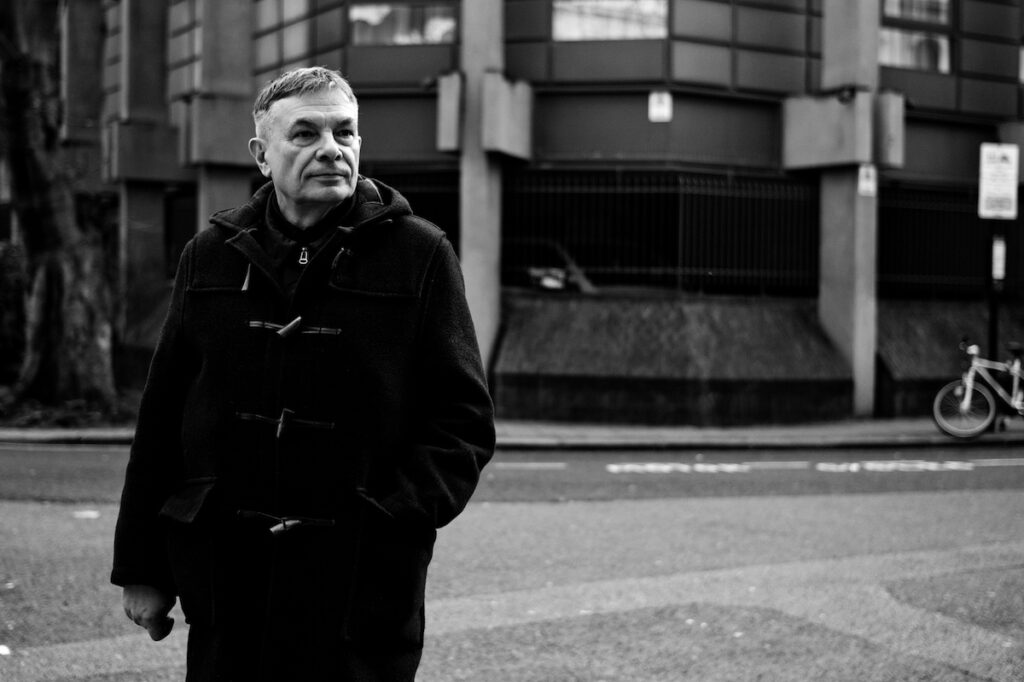
“The Sound Of The Machine’ is primarily the story of Karl Bartos, from his origins in Bavaria, through the family’s relocation to Düsseldorf and his intensive training as a classical musician at the city’s Robert Schumann Conservatory, to finding himself tooling down the fast lane of the Autobahn in 1974 in the cold embrace of Kling Klang, where he stayed, through good and bad, for the next 16 years.
The book starts off in Bavaria, with Karl visiting Marktschellenberg, surrounded by the kind of picture-postcard beauty roughly rendered on the poster that came with early pressings of ‘Trans-Europe Express’. It’s clear how Karl’s conflicting emotions about home (“I take the next flight to Hamburg – with the start of my autobiography in my head and an ambivalent Heimat feeling in my heart,” he writes) informed Kraftwerk’s conceptual and satirical framework for ‘Radio-Activity’ and ‘Trans-Europe Express’. On the one hand, each evokes a romantic German past. On the other, they both skewer German nostalgia.
He goes on to describe how his own love of music was awakened by the opening chord of The Beatles’ ‘A Hard Day’s Night’. His subsequent announcement that he wanted to leave a safe, blue-collar apprenticeship and study music instead ignited a fiery bust-up with his father, and that decision circuitously led to Kling Klang.
Karl was hired by Kraftwerk in 1974. Having added Wolfgang Flür to their duo the previous year, they needed a fourth member to bolster the line-up for a tour of the USA, following the unexpected success of ‘Autobahn’. Ralf and Florian were looking for a classically trained percussionist and approached Düsseldorf’s Robert Schumann Conservatory to find one.
At this point in time, Karl was enjoying a creative life of what he calls “cultural polyphony” – a multifaceted musical existence. He had countless performances with the Düsseldorf Symphony Orchestra and Deutsche Oper Am Rhein under his belt, he’d played a tour with the American choreographer Lester Wilson, who would go on to choreograph the film ‘Saturday Night Fever’, and was gigging with various groups. His three-year apprenticeship with the German Post Office/telephone company, leading to a job he barely did, had included a role in the works band, playing at the many events the huge organisation would hold. It seems outlandish these days, but he was also free to attend classes at the Conservatory.
By the time that Ralf and Florian got to him, Karl was steeped in music – classical, avant-garde, pop, soul and funk – as much at home with Varèse, Stockhausen and Cage as he was with Lennon-McCartney, JS Bach, Ravel and Debussy.
The Kraftwerk connection came in autumn 1974. With typical efficiency, Karl recorded the time and date of his first encounter with the Kling Klang studio at Mintropstrasse 16 – 5.30pm on 4 October. Two weeks later, Ralf collected him from the Opera House after a performance to join them for a nighttime Kraftwerk session. It would be the first of many.
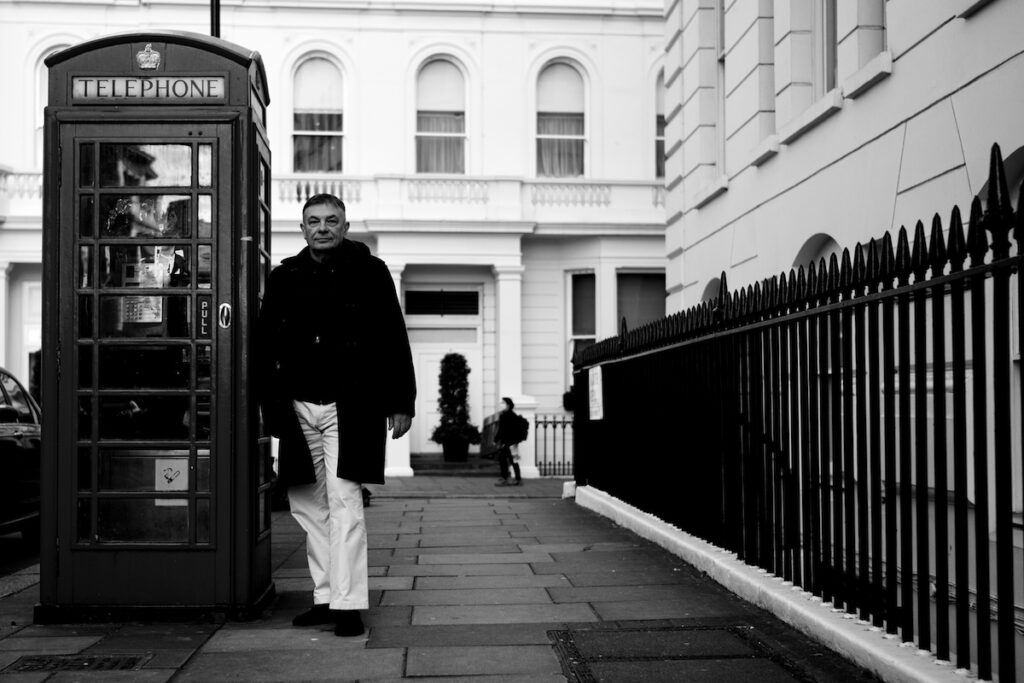
“Within Kraftwerk, I experienced one of the most fascinating encounters of creativity in my life,” Karl says. “In the beginning, Ralf often picked me up from the stage entrance at the opera house late at night and we’d drive to the Kling Klang Studio to improvise with Florian. Come to think of it, I brought the tradition, the life and spiritual power of classical music to this environment.”
To read ‘The Sound Of The Machine’ is to experience Kraftwerk through the lens of classical music. The melody Ralf came up with for ‘Europe Endless’ reminds Karl of the duet ‘Wer Uns Getraut’ from ‘The Gypsy Baron’, the operetta by Johann Strauss II. Talking about ‘Trans-Europe Express’ brings up a reference to Arthur Honegger’s ‘Pacific 231’, and he recalls suggesting that Ralf use fourths on the Orchestron, like Stravinsky.
“Ralf and Florian had no experience whatsoever with music in other contexts,” he asserts. “Of course, there is a difference between buying a record by Richard Wagner or Karlheinz Stockhausen and talking about it enigmatically in interviews, then playing these works in concert. But since I was also familiar with pop and free forms of music, I was able to adapt to my former partners. The music produced in our writing sessions back then carries the soul of our work together. And it seems to be so robust that it survives as a substitute in a digital business model.”
In some ways, Karl Bartos’ story reads a bit like a novel. A hard-working, unpretentious young man from a modest, working-class background, expected to go into a trade, has his life course radically altered by the unexpected and overwhelmingly powerful discovery of his love of music. One moment he’s learning how to wire telephone exchanges, the next he’s wearing a dress suit as a percussionist in an orchestra, then he’s being inducted into Kraftwerk and entering the gilded world of Ralf and Florian.
After the American ‘Autobahn’ tour, Karl balanced his classical studies with his Kraftwerk life. On the same day the Sex Pistols played the first of their legendary Manchester gigs in 1976, he was in the orchestra pit for a performance of Sergei Prokofiev’s ‘The Tale Of The Stone Flower’ and had already contributed to the recording of ‘Radio-Activity’.
Shortly before graduating from the Conservatory, he moved into a flat in Düsseldorf’s leafy Berger Allee, a five-minute drive from the Kling Klang studio in Mintropstrasse, where he lived with Ralf, Wolfgang and Emil Schult. The enigmatic Florian, however, lived with his mother.
“They had a huge building in northwest Düsseldorf, and he had several flats – all over the city!” Karl laughs. “He was really wild, Florian. Very unpredictable. Ralf was always super-straight, a business brain.”
The difference in their backgrounds became startlingly clear when the band decamped to Florian’s family estate in France, where our protagonist witnessed the aristocratic lifestyle, swanning about in southern Europe.
“Yes, yes – exactly!” Karl nods. “It was really a piece of France, it was so big. It was situated by the sea, but nobody was there – just four, five, six houses and a mountain, opposite St Tropez. La Bastide Blanche. It was too good to be true, like a fairy tale. It still exists, and Florian’s sister invites me all the time to come for the summer, but I don’t want to go there again. You can’t turn back the clock. It’s always one direction.”
Sounds lovely, though, I say. Idyllic.
“It was amazing, and if you’re young and you don’t think about anything, it’s just fun. It was so super-cool – a different world.”
Wealth isn’t the only contrast that comes through Karl’s telling of the story. Business nous, often a function of pre-existing privilege, was another strong point of disparity between him and his new band buddies. Ralf and Florian were aware of the brand-building exercise and ownership of said brand from the beginning.
I suggest to Karl that the Kraftwerk engineering of 1974 was to create a look that audiences would recognise – four guys in a band. And then in 1976, Kraftwerk did actually become a band, four brothers bonded by a shared life and committed to electronic music – recording, touring and socialising together. But under the bonnet in its hidden mechanics, there was a secret technology. A developing business model, owned solely by Ralf and Florian.
Karl ponders the proposition for a moment.
“Well, they signed the record deal,” he says. “After they worked with Conny Plank and ‘Autobahn’ got successful, they said, ‘Goodbye Conny’. And he was the guy who got the record deal for them.
“In the beginning, everything was very fast. The USA tour was so amazing, I was the happiest guy in the world. It was so much fun. Not money-wise, but to see America in two or three months was fascinating. And from that time on I was invited to be in the band for recordings and so on. Düsseldorf was a major place to be in Germany. We all lived there and it was just paradise.”
Part of Kraftwerk’s genius lay in this careful construction of the band in the wake of the success of ‘Autobahn’. By bringing in Karl, they fashioned a happy confluence of their own 1960s and 1970s counterculture background with his classically nurtured musical expertise.
“It became clear I could write music as well, because I knew everything about music theory, although I was very young. Ralf and Florian had been to good schools, of course, but they were not really educated musically. Yet they had a lot of knowledge about the fine arts and the feeling of making art at that particular time.”
After three electroacoustic long-players, they had thrown in their lot with electronic music. Their ability to invest would generate the conditions that allowed the Kraftwerk project to continue its experiments. Karl recounts how, following the release of ‘Radio-Activity’, new gear started turning up at Kling Klang, including an Allen & Heath desk, an MCI 16-track tape machine and an entirely new kind of device that would change Kraftwerk fundamentally – a Synthorama analogue step sequencer.
The trio of albums they recorded and released between 1977 and 1981, with Karl’s compositional skills fully engaged, is evidence of an artistic partnership working at its peak, reaching a climax in 1981 with ‘Computer World’.
The next technological step, however, would be the undoing of the classic Kraftwerk line-up.
After the triumph of the ‘Computer World’ album and world tour, the remainder of the 80s were not kind to Kraftwerk. Music-making technology caught up and overtook them. In response, Kling Klang embarked upon a lengthy process of studio digitisation, investing in the cutting-edge but cumbersome Synclavier system.
“I liked the term ‘Man-Machine’,” Karl says. “It made sense. But towards ‘Electric Café’, the man got lost. It was too dehumanised. As a concept, we thought Kraftwerk was a synonym for progress, like innovation. The computer was the logical next step, so we put our music into the computer to be recognised as modern, innovative and creative again. But it didn’t turn out to be true.”
At the same time, cycling became Ralf and Florian’s new obsession, and making music slipped down their agenda. ‘Electric Café’ was recorded and scheduled prior to an almost neurotic era of tinkering, not helped by a bad cycling accident Ralf suffered.
‘Electric Café’ was cancelled and rescheduled. When it was finally released in 1986, it was not well received. Relationships within the band, already atomised, broke down. Wolfgang quit, although it looked more like he just stopped turning up to the studio, and Karl followed in August 1990.
As he’s made clear, Karl hasn’t got much time for today’s iteration of Kraftwerk, but the catalogue he helped conjure remains one of the most important in popular music.
“The secret of our work together was that we created music in a room – it was polyphony,” he says. “But the problem was that my input, and the input of Wolfgang and Emil, got absorbed into the trademark. Kraftwerk changed from an artistic collaboration into a digital business company.”
Karl Bartos says he has a new project on the way, but he can’t yet reveal much about it.
“I’m a little bit tired of three-minute pop music,” he replies when I ask him what he’s planning. “There’s so much good pop music written by The Beatles and from the pre-Beatles era – it’s hard to top them. You have to be very careful and think long about it. Or you put together three or four people who can be a cultural subject, like Kraftwerk was in the beginning.”
And so he’s returned to his own classical music training for inspiration.
“Back to Bach and the Renaissance. If you listen to Monteverdi, do me a favour and listen to ‘L’Orfeo’, the first opera, or other composers from the Renaissance. Some of it sounds like the music of today.
“I always like to go back into the history of music – take a little bit from here and there – to the time when Bach lived, the age of enlightenment, to when we had the first idea to decode the world into zero and one. The German polymath Leibniz came up with that idea. It opens up a completely new perspective on today’s world. Some in Kraftwerk said, ‘You never look back, always look ahead. If you look too much in the rear mirror, you make a crash’. But I don’t think so. I think you have to look in the rear mirror once in a while, to know where you’ve come from.”
‘The Sound Of The Machine: My Life In Kraftwerk And Beyond’ is published by Omnibus on 21 July. You can order your copy from the Electronic Sound shop now.
